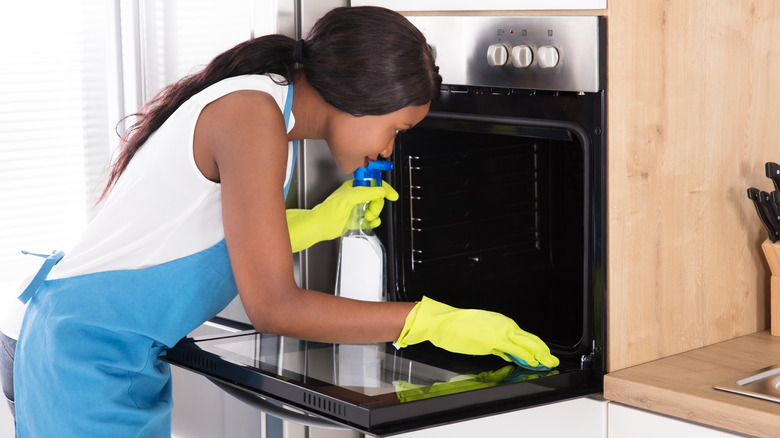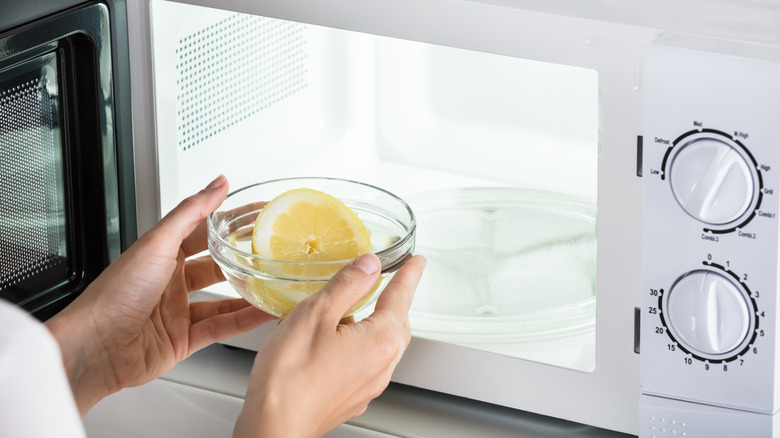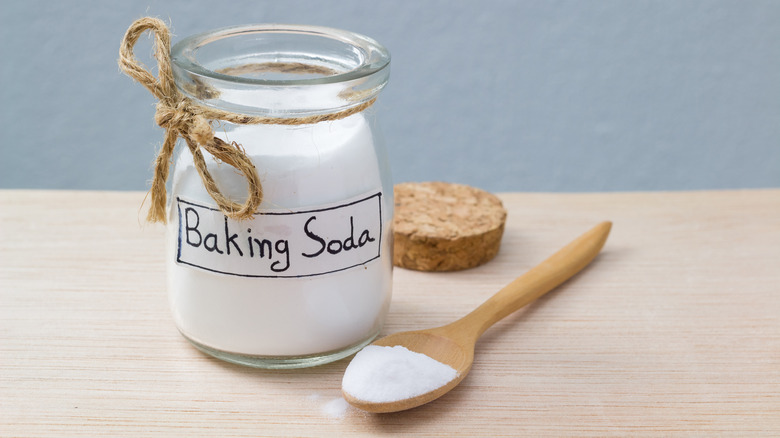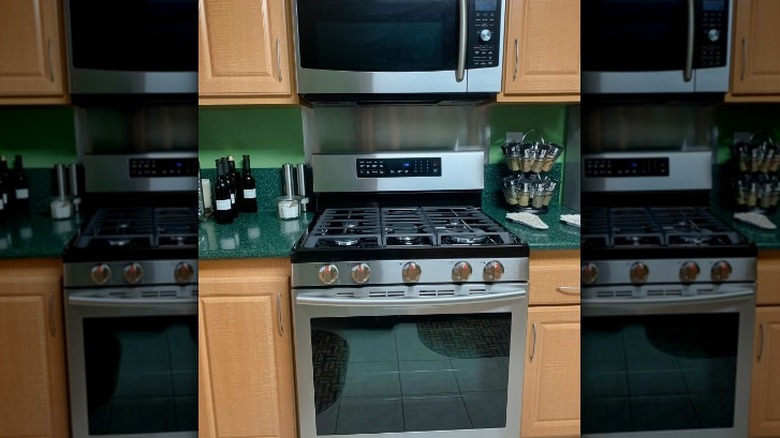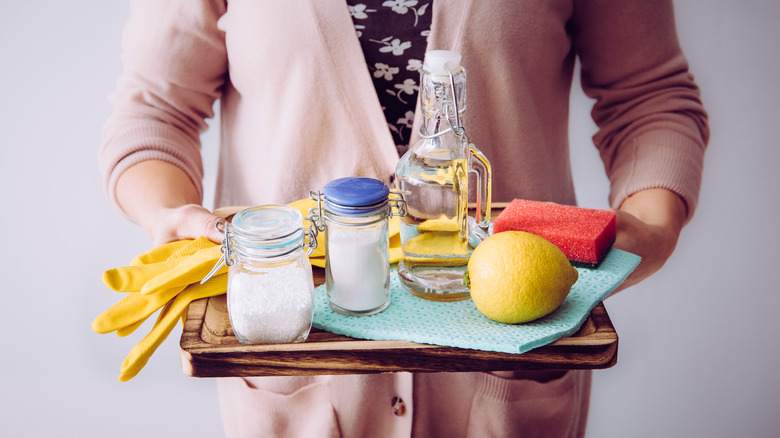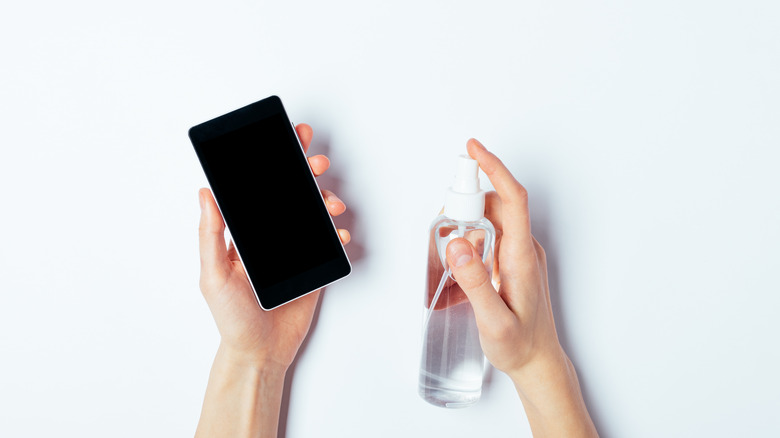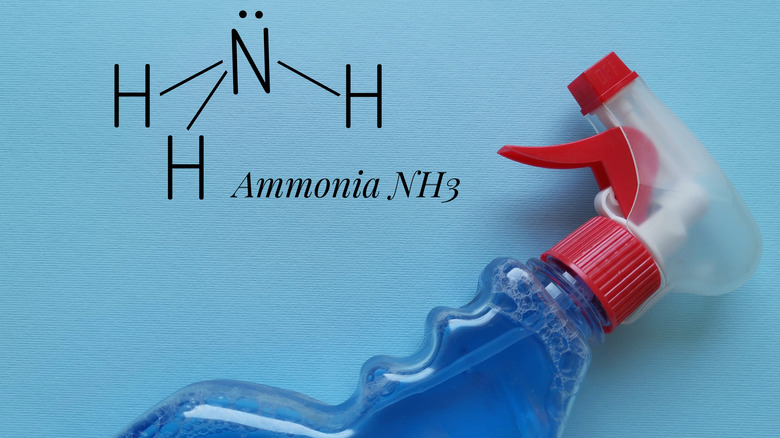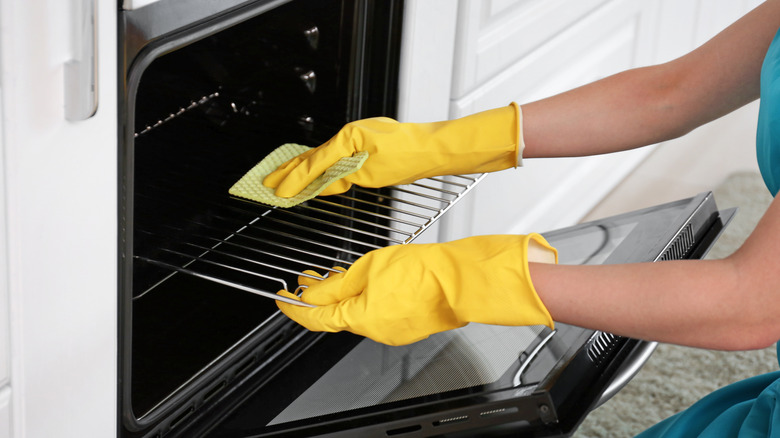What Are The Best Ways To Clean Your Oven Naturally?
We may receive a commission on purchases made from links.
Are you looking for how to clean an oven quickly but thoroughly in a healthy and stress-free way? Well, you're in the right place. Showcasing your cooking skills in the kitchen is all good and fun until mystery messes start hugging the appliances you once swore to keep brand new over years of usage.
Get this: If you're wondering why your oven is always a mess, Ovenclean discovered the causes recently. They explained that people who don't wipe spills immediately, wrap veggies and meat in roasting bags before throwing them in the oven, and do not clean their oven regularly are likely to mess up their units faster and to an appalling degree.
But while there are options available to you when it comes to cleaning your oven, most of these oven cleaning hacks involve the use of harsh chemicals, while the less invasive ones don't work on tough stains. This is why we at House Digest have curated this list to give you the best way to clean your oven without any glitches; both for self-cleaning and convection ovens.
Use lemon juice
Using lemons sounds too vague, right? Well, it works. In answering the question, "why are lemons good for cleaning," Homes & Gardens revealed it's because lemons have low PH levels, high citric acid levels, and also contain antibacterial agents. They added that lemon juice is a non-invasive cleaning remedy that doesn't damage the material it's applied to but instead adds a lovely fragrance to your oven. However, Treehouse warns that lemon juice steam is only effective for cleaning ovens that are not overly dirty.
Anyway, let's dive into how to clean your oven with lemons, as explained by Maggie's Oven Services. So, for stage one cleaning, squeeze two lemons in a glass bowl of hot water and place it inside your closed oven for 3-5 minutes. This should melt the sticky grease and loosen the stubborn deposited fat. After this, move to stage two by wiping off the loose dirt and rubbing the exposed surface with the juicy face of sliced lemon.
Now, make a cleaning spray of lemon juice, dish soap, and water, and spray it on every part of your oven as you wipe it with a rag. Remember to rinse the oven with a clean piece of cloth soaked in clean water. After the cleaning, allow a few minutes for the oven to dry out before cooking in it again.
Clean with baking soda and water
In 2020, Bren did carried out a test to uncover which is the most potent out of the eight most popular oven cleaning hacks that use all-natural ingredients for a no-scrub chore that leaves a horrible-looking oven sparkling clean. At the end of the experiment, it was discovered that using the simplest remedy (a solution of baking soda and water) is the best way to clean your oven naturally.
But why is baking soda good for cleaning? According to Live Science, every particle of baking soda has a unique mineral structure that offers a non-invasive abrasive that's capable of lifting stubborn grease and other organic messes off an oven. Now that you know how baking soda transforms an unsightly oven, here's how to clean your oven with baking soda and water, going by Martha Stewart's guide.
So, the first step is to make a baking soda paste by stirring 3/4 cup of baking soda in ¼ cup of warm or hot water. After this, take your oven racks, wash them with dish soap, rinse, and dry them. Now, cover every opening in your oven with foil tape and, afterward, apply your homemade baking soda paste to cover every surface of the oven and leave it to sit there until the next day. Coming back to it the next day, scrape the now solidified baking soda paste carefully off your oven, wipe the oven with a damp cloth, and leave it to dry before baking anything.
Use the self-cleaning option
This cleaning hack is strictly for self-cleaning ovens. In other words, if yours is a convection unit, move on to the next cleaning method below. Before using the self-cleaning function, read the user's manual of your oven meticulously, keep the kitchen windows open for fumes control, and take your pets outdoor. Also, make sure you're doing this chore on a day you'll be at home all day, as instructed by How Stuff Works.
Let's follow the steps of Housewife How-To's process for self-cleaning ovens. First off, clear the space around your oven (especially the countertop) to isolate the system and avoid letting it burn the things around it. Next, sweep out loose debris from the system to reduce smoke. Finally, ensure that the oven door is closed securely to prevent malfunctions and outbreaks during the process.
Now, follow your user's manual to set up a self-cleaning cycle for your oven. Basically, your unit will be adjusted to a temperature high enough to burn dirt and turn messes to ashes. Ideally, a self-cleaning oven has a four-hour cleaning cycle for heavy-duty cleaning and a two-hour cleaning cycle for light-duty cleaning. Once the chosen cycle is over, allow the unit to cool, wipe out the ashes, and then mop the entire oven with a damp rag. If your unit has a steam-cleaning function, How Stuff Works encourages using it as additional upkeep to keep your oven cleaner.
Use vinegar, elbow grease, and baking soda
For those of you with ovens that are grossly messed up with patches of burnt-on food particles, Real Homes suggested that cleaning them with a solution of baking soda, vinegar, and elbow grease is a natural but effective method. But how do you go about it and make sure you get the best results? Well, let's go by what Simply Spotless said.
Make a thick baking soda paste by adding a few tablespoons of water to half a cup of the powder. Cover the most greasy spots of the oven in the thick paste and allow it to stay there for 12 hours. At the end of the day, wipe off the applied paste with a damp tissue or a piece of old cloth. Note that you may need to use a scraper to lift hardened paste. Anyway, after eliminating the hard stains with the paste, spray the entire oven with a bottle of vinegar and then wipe it clean. Finally, get a bottle of Elbow Grease and use it to give the oven a final touch-up.
Apply rubbing alcohol and dish soap
Rubbing alcohol is largely composed of cleaning agents that leave every surface squeaky-clean and germ-free. According to Times Food, this household liquid renders stubborn grease stains pliable and easy to clean off a warm oven –– so you better make sure you apply it when your oven is warm.
To upkeep a lightly dirty oven with rubbing alcohol, Bren did said you should mix 1/4 cup of rubbing alcohol with eight drops of dishwashing soap and 1/4 cup of clean, warm water. Stir the mixture vigorously to activate the cleaning agents. With the mixture ready, Cottage Notes explained, use a ball of cotton wool to apply it directly to the stains and allow about 5 minutes before wiping the applied mixture off along with the stains. No incessant scrubbing is needed! Users beware of missing an important step of eliminating the smell of alcohol from your oven by mopping it with a rag and water.
Use ammonia
Imagine going to bed at night and surprisingly waking up to a super clean oven the next day. Use ammonia. According to One Good Thing, ammonia (which is not even expensive unlike those harsh commercial chemicals) is known for dissolving age-old messes on ovens and stoves. However, The Spruce warns against cleaning gas-based ovens with ammonia as this poses fire risks.
So, what do you need to take a few steps before going to bed so you can come back to a glowing oven? Well, Fabulessly Frugal said you need hot water, a bottle of ammonia, a couple of sponges, two heat-resistant glass dishes, and your dirty oven. They further explained that you should pour 2 cups of ammonia into one heat-resistant glass dish and 2 cups of boiled or hot water into the second dish. Finally, sit the ammonia dish on the upper rack of the oven and the hot water dish on the bottom. Close the oven door and go to bed. When you wake the next morning, take out the two dishes, reach for your two sponges, and use them to sweep out the dissolved mess.
Prevent messy build-up
Prevention is better than cure. Yes, a cliche, but it's the truth. The point is, you don't have to let your oven gather a lot of stains and reach the stage of no-return before cleaning it. To that end, The Oven Cleaning Company shared seven powerful tips to keep the oven clean in-between clean-ups. They said you should wipe up messes immediately they land around the oven, cover bubbling food tightly with a cover lid during cooking, and prevent splatter of fat and grease by placing chickens and fish in a roasting bag before roasting them.
Real Simple also added that ovens should be cleaned every six or even more often, depending on how frequently you use the unit and the kind of food you cook in it. And concerning the bottom of the oven that gets messy the most, Wilshire Refrigeration & Appliance suggested protecting it with a dishwasher-safe oven liner. You might as well sign an oven cleaning contract with an oven cleaning company near you if you're willing to go that far for an oven that will be neat all year round.
